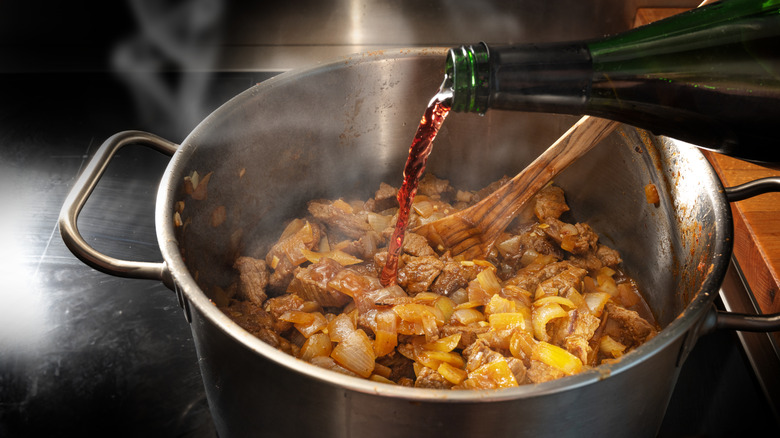The Reason You Should Avoid Using Cooking Wine
Wine and cooking go hand in hand — and not just as the chef's assistant in a glass. When that tantalizing fermented grape juice is incorporated into a dish, it can have an astonishing impact on the overall flavor profile. But not all varietals are equal. Some folks gravitate towards cooking wine when subtle fruity characteristics are called for in a meal, but according to an expert, that's a mistake you definitely want to avoid.
Antonio Morichini is the chef and owner of Via Vai in Queens, New York. His knowledge of authentic Italian cuisine and quality vino has helped him achieve success at the highest culinary level, and he had a thing or two to say about using cooking wine in a dish — one being that he avoids it. He said, "I don't ever recommend using cooking wine as they often have additives and preservatives."
Some of those additives often include salt and sweeteners. For instance, when trying to balance a recipe with the intoxicating flavor of Cabernet Franc (a great wine to pair with corned beef and cabbage during a St. Patrick's Day feast) you are probably not attempting to introduce salinity or an abundance of sweetness to the cuisine. Ultimately, the preservatives in your typical cooking wine make it more of a problem than a solution. As for what Morichini actually uses instead of cooking wine, he succinctly said, "In my cooking, I only use Italian wine." With good reason, too.
Cooking wine can't hold a candle to the real thing
It is often said in culinary circles that you shouldn't cook with a wine you wouldn't drink. All the additives in cooking wine can make it taste overly salty and sweet — not exactly a desirable sip that would have you coming back for more. If it doesn't please the palate by itself, should it really be expected to magically transform into something flavorful when added to your home-cooked cuisine?
Morichini doesn't use authentic Italian varietals in his contemporary Italian food just to say they are there. They are incorporated purposefully to elevate the end product. "Real wine has natural flavor and aromas," he said, "and you can really tell the difference in the final dish." Depending on the type of wine you use, the tannins in the variety and the other notes fruit, oak, vanilla, and more all combine to create a delicate elevation of flavor in your fare.
However, if the idea of putting upscale red or white nectar in your food as opposed to your glass puts you off, you don't have to go with the highest quality varietal available. Trader Joe's has cheap wine that's considered decent, and plenty of other retailers also offer far better options than preservative-ridden alcohol. You don't have to break the bank to incorporate the elegant aroma of vino into a home-cooked meal, so long as you avoid cooking wine — and all the additives that accompany it.

